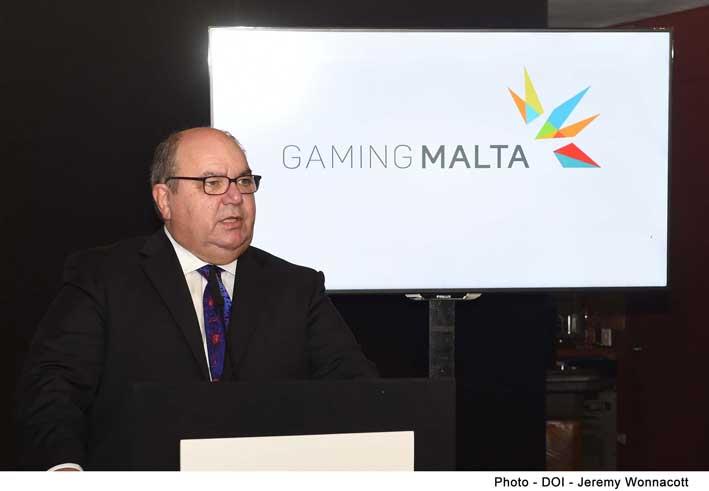The gaming sector contributes €1.2 billion to the Maltese economy – 12 per cent of GDP. Do you believe that the industry is still growing or has it reached saturation point?
The gaming sector certainly has room to grow, especially with the shift to skill and fantasy sport-based games. The Ministry decided to issue a legal notice to cover these new types of games and we have had a significant number of applications. An American company based in Boston has recently launched their European headquarters here in Malta, which is a very good indication of growth.
The Ministry is also planning to introduce new legislation for the iGaming sector. Malta has always been at the forefront of promulgating regulations for the industry, and I think that, over the years, we have done well to promote the country as a professional that encourages investors to set up shop here.
There are obviously other advantages such as political stability, good connectivity, the fiscal regime and the weather.

Brexit has had some serious implications with regard to Gibraltar, which is another Mediterranean iGaming hub. Is the Ministry looking to tap into this market?
Yes, the Malta Gaming Authority and Gaming Malta Foundation (which is the PPP that promotes the gaming industry in Malta) have definitely been looking into this in a subtle, non-aggressive manner. Gibraltar holds about 50 large gaming companies and hopefully we may be able to attract some big names to come over to Malta.

While gaming has certainly boomed in Malta, it has also led to a number of consequences: inflation, astronomical increases in rental prices, etc. What steps is the Ministry taking to counteract these?
With every good thing in life there are obviously certain aspects that need to be taken into consideration. For instance, the majority of the workforce is occupied by foreigners, which means that they need office space, places to live, and schooling for their children. One of the effects of this influx is that the value of property, specifically within the rental market, has increased. This is something we are looking into and we are trying to open a discussion between stakeholders to examine the situation.
With regard to education, the government has recently announced that a new international school will be established in Mtarfa, since this was one of the major concerns of families moving to Malta.
I do believe that if one puts everything into perspective, the industry is doing quite a lot for the country, in the sense that the government is able to earn millions from taxation and licensing, which is used for the benefit of the citizens. The industry also puts roughly €1.2 billion – or 12 per cent of GDP – directly into the economy and employs approximately 9,000 people.
It is also important to begin to encourage young people to move away from traditional occupations such as lawyers or architects and begin looking at professions in the iGaming and financial service industries which reflect the modern digital era.

The textile industry was once a cornerstone of the Maltese economy. Are you able to guarantee that the gaming and financial service sectors will be enduring and sustainable industries for the country?
On top of the iGaming sector, financial services currently provide about 12-13 per cent of our GDP. Finance Malta, which falls under this Ministry, is doing a lot of good work to attract more investors to Malta. It has been sending a number of trade delegations around the world – in fact, this year I have visited Dubai and Abu Dhabi which resulted in a memorandum of understanding with the former’s Financial Services Institute. We are working on enhancing this initial relationship. There are also other missions to Singapore, Hong Kong and the Gulf States, so the reach is really considerable.
We are currently living in a digital revolution. The future is here and while it means that traditional jobs will fall by the wayside, it is not a loss since the digital single market is a priority of the EU Commission. A digital single market will improve the situation for everyone throughout the EU and it is for this reason that we must prepare our youth and future generations.
The Ministry also looks to provide tools to people for innovation. MITA, for example, provides about €276,000 for business start-ups.

What measures is the Ministry taking in order to address cyber security in Malta?
A lot is being done. We always try to encourage children to familiarise themselves with this digital world. We need to look at the internet positively but to be aware of the dangers to both individuals and businesses. We have worked with Vodafone, Melita and GO to educate people about responsible smart phone use. There is also an educational campaign on cyber space and security.
We are also doing work with the Responsible Gaming Foundation to help people with a gambling addiction.
The abolishment of roaming fees is due in a couple of months. Are you able to tell me when this will occur?
15 June. This is a very important item during Malta’s EU presidency and a really great achievement for the digital single market. Soon people will be able to use their data, internet, text and telephony for the same charge while travelling abroad.
There has been an informal meeting between EU leaders on Ocean Governance. Can you tell me what was on the agenda?
The meeting is related to Ocean Governance and the Blue Economy. The sea has a great potential that we are not using to its fullest. It can create more jobs, a better economy and greater investment. Ocean Governance is the baby of our Commissioner Karmenu Vella. Currently, 60 per cent of our seas are not governed by anybody. It is an interesting subject that is being discussed at both UN and EU level. The members were also able to sign the Valletta Declaration during the meeting.